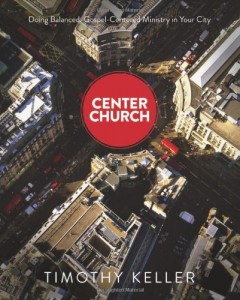 Tim Keller has been a highly influential figure in evangelical circles for quite a while. He is the pastor of Redeemer Presbyterian Church in New York City and has written several books including the Reason for God and The Prodigal God. This winter, while thinking through the deacon ministry at our church, I picked up his book Ministries of Mercy and was blown away. As a rooted evangelical, the topic of mercy ministry and social justice have always been associated with liberal Christianity. However, Ministries of Mercy presents our biblical mandate to love our neighbor as ourselves in a disarming manner. Having read that book, I was drawn to his more recent book, Center Church.
Tim Keller has been a highly influential figure in evangelical circles for quite a while. He is the pastor of Redeemer Presbyterian Church in New York City and has written several books including the Reason for God and The Prodigal God. This winter, while thinking through the deacon ministry at our church, I picked up his book Ministries of Mercy and was blown away. As a rooted evangelical, the topic of mercy ministry and social justice have always been associated with liberal Christianity. However, Ministries of Mercy presents our biblical mandate to love our neighbor as ourselves in a disarming manner. Having read that book, I was drawn to his more recent book, Center Church.
One of the things I appreciate most about Keller is how practical he can be. I read a lot of books that critique church culture, diagnose theological issues, and speculate theories on where our current course is heading. While Keller does a bit of this, it is rarely without practical steps, creative ideas, and intentional actions to move forward in ministry.
There are a few highlights worth mentioning. The book is broken into three sections: gospel, city, and movement. Beneath the first heading, Keller gives a positive and balanced account of “revival.” This has been an anachronistic term of which I’ve had little use. It conjure up tent meetings, invitations, and emotionalism. However, Keller defines revival (or renewal) as “an intensification of the normal operations of the Spirit (conviction of sin, regeneration and sanctification, assurance of grace) through the ordinary means of grace (preaching the Word, prayer, and the sacraments) (sidebar, page 54).” With this definition, “gospel renewal” requires a focus on the sacrificial death of Jesus, his substitutionary atonement for our sins, and the everlasting life available to those who receive these truths. This is a helpful reminder as I often become overwhelmed by the sheer volume of pastoral concerns pastors and elders must address.
Another highlight has been some distinctions Keller makes (with the help of Richard Niebuhr) regarding how the church relates to the culture. These categories have been very helpful to me in that I have often adopted an aspect of all of them over time. The “models” for the church relating to culture are the:
- The Transformational Model (the church transforms culture)
- The Relevance Model (the church and culture are compatible)
- The Counterculturist model (the church is nothing like the culture)
- The Two Kingdoms Model (earthly kingdom vs. redemptive kingdom).
Chapter 16 gives a balanced presentation of each of these by offering both the good and the bad of each. A balance between them all is advocated in the end.
Part 7 (chapters 22-26) on Integrative Ministries is where Keller proves to be most helpful, in my opinion. He identifies what he calls “four ministry fronts:”
- connecting people to God (evangelism and worship),
- connecting people to one another (community and discipleship),
- connecting people to the city (mercy and justice), and
- connecting people to the culture (integrating faith and work)
Categorizing these functions of the church help to envision well-rounded ministries and identify the strengths and weaknesses of any congregation.
Finally, Keller makes some helpful distinctions between movements and institutions without favoring one over the other. One of the most difficult parts in helping to lead a small non-denominational church is enjoying the flexibility and freedom of minimal organization while recognizing the need for policies and organization. While rightly acknowledging the inevitability of institutionalization, Keller also stresses the importance of maintaining a “movement mind-set.” This has been particularly helpful in that there seems to be a freedom in operating between the two poles.
Much more could be said about the book, obviously. I don’t share all of Keller’s opinions by any means. He is definitely called to urban ministry and he presents a compelling case for such ministry. But some are called elsewhere, a point he concedes quite candidly. Much of his talk of contextualization is specific to cultural centers such as New York City. However, while he uses those specific examples, I think the book does a great job of providing guidance to discover ways to contextualize the gospel anywhere, which was his aim from the beginning. I highly recommend any one who is involved in ministry to read Center Church. It may even be a helpful book for an entire congregation to read through together.



Great review, Ben! I just rediscovered your site after losing track of it for awhile.
Hey Amy! It hasn’t really been up long. I’ve been trying to populate it and post often before casting it out there. Glad you stopped by. By the way, you are the first legitimate commenter on any WordPress site I maintain.